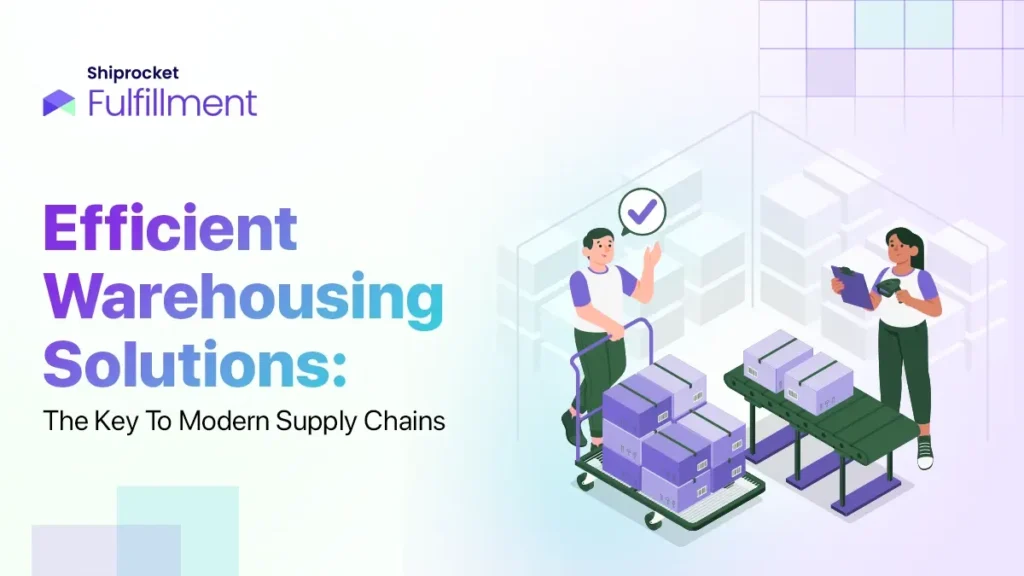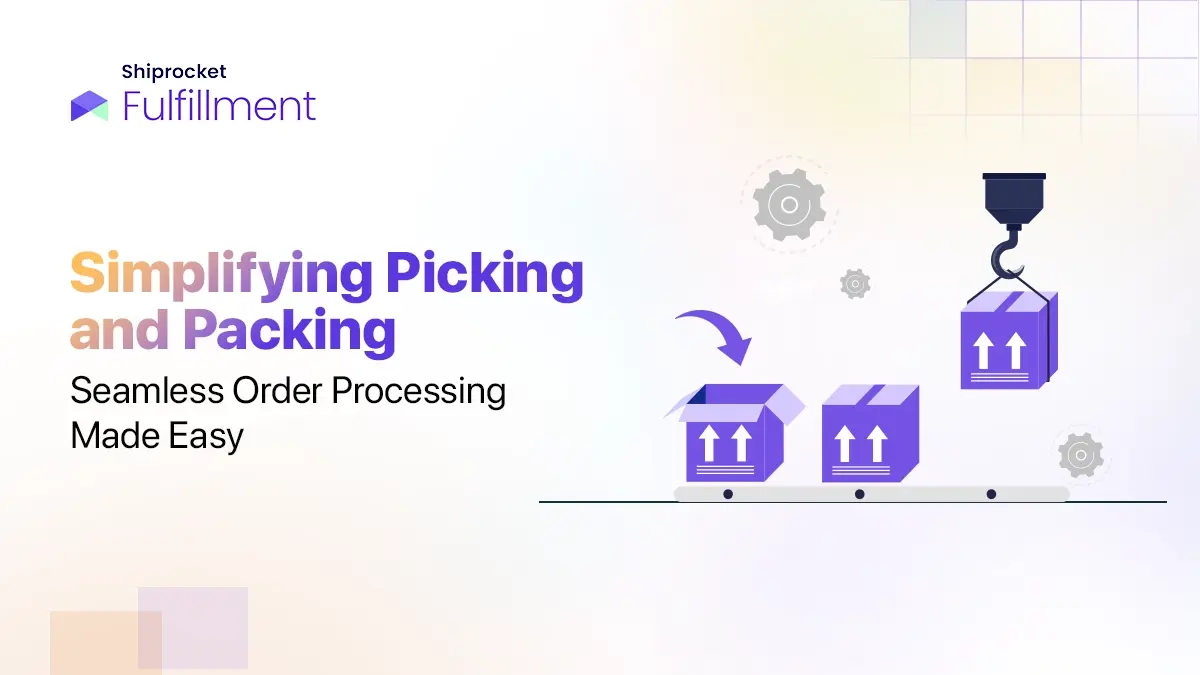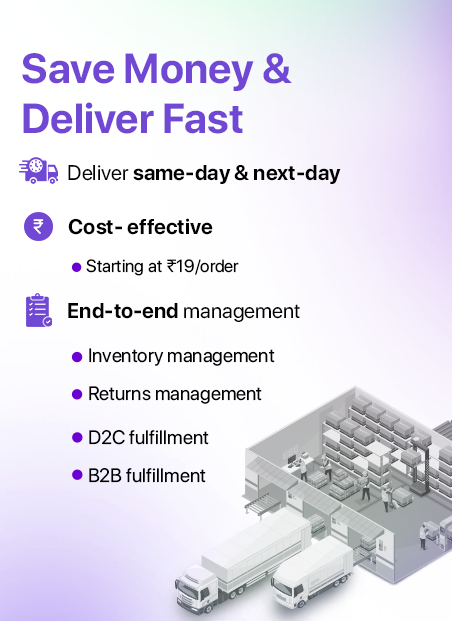Introduction
Warehousing solutions are critical components of today’s supply chain. Your choice of warehouse partner is important because it can have a significant impact on the efficiency of your logistics and supply chain operations. Warehousing is necessary for safely holding your inventory and ensuring on-time delivery. With the ever-expanding eCommerce activities, warehousing has evolved to be a key asset for organisations of any size. The warehouse business in India has expanded drastically with the adoption of integrated storage solutions. According to projections, the Indian warehousing sector will reach a market size of INR 2872.10 billion by 2027. This implies that storage facilities will remain critical to the success of your supply chain management.

Here, we will delve into the different roles of warehousing and the importance of choosing efficient warehousing solutions for your business.
Warehousing and Its Role in the Supply Chain
Warehouses are an essential component in modern supply chains. They serve as a link between suppliers and customers, ensuring the smooth flow of goods. While often seen as places for storage, they have a broader role to play. Let’s explore the various functions warehouses serve in improving supply chain management.
- Storage and Inventory Management
Warehouses safely store your goods and help you manage your inventory. This keeps you from running out of products and enables you to meet customer demand, even when supply chain hiccups happen.
- Risk Mitigation
Warehouses protect your goods from damage, theft, and bad weather. Having warehouses in different places can save you when unexpected things like natural disasters or transport problems occur.
- Value-Added Services
Warehouses can also be a place to do extra activities like packaging, labelling, and customising products. This helps ensure your goods stay safe during shipping and meet your customers’ unique needs.
- Order Fulfillment
Warehouse staff take care of everything when customers place orders. They pack the items and ship them to the customers. Good warehouse management makes this process quick and accurate.
- Cross-Docking
Cross-docking is a way to move goods quickly. Products go from incoming to outgoing trucks without waiting in a warehouse for long. This is great for products that need to get to customers fast.
- Demand Stabilisation and Seasonal Inventory Management
Warehouses help manage changes in customer demand and the need for seasonal products. They can be used to keep extra stock to make sure you can meet customer needs when demand is high.
Knowing these functionalities will help you understand how warehouses are essential for your business in modern supply chains. They help cut costs in logistics, prepare for unexpected shipping situations, and keep customers happy with timely delivery.
The Three Components of Warehousing Solutions
1. Inventory Control and Management
Inventory control and management are the foundational aspects of efficient warehousing solutions. They systematically track, organise, and oversee all goods stored within a warehouse. Here’s a closer look at why this component is of utmost importance:
- Preventing Shortages and Overstock: Inventory control and management maintain the perfect quantity of products to meet customer demand without running out or having excess stock. Keeping the right amount of products can save money and increase your profitability.
- Getting Orders Right: Accurate inventory management is the foundation of fulfilling customer orders precisely and on time. This keeps your customers satisfied and builds a strong reputation for your business.
- Predicting Your Needs: You can make informed decisions about future stock levels by analysing your historical inventory data. This helps you align your product offerings with customer demand, reducing the risk of overstocking or running out of popular items.
2. Warehouse Layout & Design
The layout and design of a warehouse significantly influence its overall efficiency and performance. A well-considered layout contributes to the smooth movement of goods, minimises material handling distances, and enhances workflow. Here’s a more detailed perspective:
- Optimising Space: Effective warehouse layout is all about getting the most out of your storage space. It ensures that your goods are stored in a way that maximises space utilisation while keeping everything easily accessible.
- Reducing Congestion: With a smart layout, you can minimise congestion in your warehouse. This translates into faster and more efficient operations.
- Improving Workflow: An optimised layout enhances the overall workflow. It means goods move efficiently, equipment is logically placed, and there are clear pathways for you and your employees to follow. Safety and ergonomics are also considered, reducing the risk of accidents.
3. Warehouse Management Systems (WMS)
Warehouse Management Systems (WMS) are the technological backbone of modern warehousing solutions. These software solutions offer various benefits for efficient warehouse operations. Let’s explore these in more detail:
- Speed and Efficiency: WMS software automates various tasks, like order management and inventory tracking. This automation saves you time and reduces the chances of errors. With smoother and more efficient processes, you can serve your customers faster.
- Real-Time Insights: With WMS, you get the latest information on your inventory, order status, and shipment tracking. This keeps you well-informed and helps you make fast decisions to meet your customers’ changing needs.
- Smart Staffing: WMS offers insights into employee productivity, helping you optimise staffing levels. Your warehouse operates more accurately and efficiently with less manual data entry and tracking. This way optimising your labour resources leads to cost savings.
- Adaptability: WMS solutions are scalable and adaptable and, hence, can accommodate your business changes and growth. They allow your business to evolve and adjust its operations to meet new demands. This flexibility ensures you can continue to serve your customers effectively.
The Importance of Choosing an Efficient Warehousing Partner
Selecting the right warehousing partner is essential due to the evolving role of warehousing solutions in modern supply chains. These partners play a key role in logistics, from receiving products to delivering them to end customers. Here’s a detailed look at why choosing an efficient warehousing partner is so important:
- Optimised Operational Costs: Efficient warehousing partners can help streamline operations and reduce operational costs. By minimising the expenses on storage, labour, and transportation, your business can experience better margins.
- Enhanced Inventory Management: Efficient warehousing partners provide real-time insights into your inventory. This level of visibility is invaluable for maintaining the delicate balance between supply and demand. It reduces the risk of overstocking or understocking, which can result in stockouts, excess carrying costs, or missed sales opportunities.
- Faster Order Fulfillment: Warehouses with advanced technology and efficient processes can significantly accelerate order fulfillment. Orders can be processed, picked, packed, and shipped more efficiently. This speed in order processing translates into quicker delivery times.
- Scalability: An efficient warehousing partner should be adaptable and can grow with your business. Whether you’re a startup with modest needs or an established corporation with high demand, the right partner can adjust to your specific requirements. This scalability ensures that your warehousing solution remains a perfect fit as your business evolves.
- Risk Mitigation: Efficient warehousing solutions often include advanced security measures and disaster recovery plans. This reduces the risk of loss due to theft, damage, or natural disasters.
- Flexibility: In today’s fast-paced business environment, supply chains are subject to frequent changes influenced by market fluctuations and seasonal demands. An efficient warehousing partner can adapt to these changes, ensuring your supply chain remains flexible and resilient.
- Market Expansion: Warehousing partners strategically located in different regions can help you expand your market reach. These partners enable you to reach customers in more geographical areas effectively. This supports business growth and the exploration of new opportunities.
- Competitive Advantage: Efficiency is a key differentiator in today’s competitive business landscape. An efficient warehousing partner can help your business outperform competitors by offering faster delivery, better customer service, and cost savings that can be reinvested into other aspects of your operation.
- Data-Driven Decision Making: Advanced warehousing solutions provide extensive data and analytics access. This can be harnessed to make informed inventory levels, demand forecasting, and supply chain optimisation decisions.
- Customer Trust and Brand Reputation: Ultimately, the efficiency of your supply chain, including your warehousing partner, directly impacts your brand’s reputation. When customers consistently receive their orders on time and in excellent condition, they are more likely to trust your brand and become loyal clients.
When picking a partner, remember these tips:
- Look for extra services like kitting and order fulfillment
- Choose a location near transportation hubs and your target market
- Ensure they have a good Warehouse Management System (WMS) for real-time tracking
- Check if they can handle seasonal changes
- Make sure they have strong security measures
- Visit them in person to get a better understanding
Transforming Logistics: Shiprocket Fulfillment
Regarding modern warehouse and logistics solutions, Shiprocket Fulfillment is a flexible choice that meets the demands of eCommerce and retail businesses. Both B2B and B2C activities can be streamlined with the help of this all-in-one platform. Shiprocket Fulfillment is the leading name in inventory management, effective cargo shipping, and performance assessment, owing to its wide network of strategically positioned fulfillment centers across the country. It provides an extensive overview of your supply chain and centralises order management by combining various sales channels. You can also make use of the advantages of quick delivery services. Shiprocket Fulfillment’s ultimate objectives are to improve order management, enhance shipment speed, and build client connections.
Conclusion
In your business journey, the strategic placement and utilisation of warehousing solutions can play a crucial role. These services are integral to tackling the complex supply chain management puzzle. Warehousing solutions impact your current operations and future business prospects. While the specific offerings of warehouses may differ based on their core objectives and technological capabilities, fundamental functions like storage, inventory management, order processing, and essential fulfillment services remain universally vital. This strengthens the significance of modernised warehousing services in today’s dynamic and competitive business landscape.
The commonly used warehousing solutions are Warehouse Management Systems (WMS), Inventory Management Systems (IMS), Transportation Management Systems (TMS), and Enterprise Resource Planning Systems (ERP).
Contemporary warehousing solutions use techniques like augmented reality, automation, robotics, and data analytics. These enhance operational efficiency and facilitate data-driven decision-making.
Different types of warehouses include private warehouses, public warehouses, bonded storage, cooperative warehouses and distribution centers.





